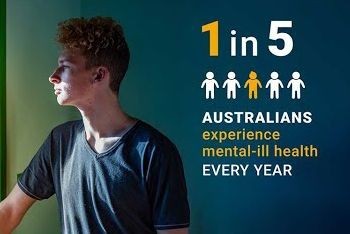A crisis in the mental health of Australia is costing the economy between $43bn to $51bn per year, according to a draft paper by the Australian Government’s Productivity Commission.
The Mental Health, Draft Report [1] revealed that beyond this alarming statistic, an approximate $130bn additional cost is created by diminished health and reduced life expectancy for the one in five Australians living with psychological conditions.
The draft highlights the complexities around defining a mentally healthy workplace but acknowledges the recognised risk factors and stressors that can impact mental health in the workplace. The role of Employee Assistance Programs (EAP) and the importance of investing in research and evaluating outcomes were also identified.
Workplaces must take a stance against mental ill-health. While diseases and physical conditions tend to affect older generations, mental ill-health inhibits our working lives, limiting the ability to secure and retain employment.
There are four main job-related factors that exacerbate psychological conditions, including: job demand and control, caused by a lack of control over highly cognitively and/or emotionally demanding jobs; a perceived imbalance between effort and rewards; job insecurity and exposure to trauma.
Businesses need to be mindful of the impact they have on employees’ mental wellbeing through the job itself, workplace culture and organisational support including recognition, stigma and the physical environment. Employers should also support employees in the workplace and with external stressors, such personal issues and lifestyle needs.
See the below lessons that businesses can take from the report, to improve the mental health of their workforces.
Mental Health Codes
Almost half of all Australian adults will meet the diagnostic criteria for a mental illness at some point in their lives, showing the scale of the issue.
Bosses must create an open dialogue around mental illness, free from stigma and fear of discrimination and should be given it the same importance consideration as physical health and safety, when developing processes and health codes.
Absenteeism and Presenteeism
Absenteeism from people with mental ill-health or their carers, is roughly five percentage points higher than the average worker. Additionally, presenteeism amongst this group can be anywhere between five and eight times higher.
This issue costs Australian businesses somewhere between $13bn and $17bn annually in lost activity, with potential further losses due to the secondary effects on colleagues. Allowing employees to take time off to manage their mental ill-health is essential in helping them to remain productive and to allowing managers to direct workflow.
Early Intervention
Employees most commonly come to us for help with stress, anxiety and depression, which can all greatly benefit from early intervention and management. Worryingly, the report reveals that 40% of sufferers don’t seek professional help for their condition. This makes the role of the workplace in supporting mental wellbeing essential. Employers must train managers to identify and engage with mental ill-health sufferers and encourage them to get help from an Employee Assistance Program or other professional.
Stigma
Stigma is one of the biggest barriers to getting help for psychological disorders, with the report highlighting that it reduces the efficacy of mental health programs. It also discusses the importance cultural differences around the issue.
In addition, we encounter mental health stigma regularly in male-dominated industries, such as construction and mining, which can harbour a ‘macho’ culture where asking for help is seen as a weakness.
Regardless of industry, it is also important that employees feel that they can trust employers enough to reveal their mental health conditions. The report found that a fear of discrimination and lack of support from bosses, has led to 38% of people living with psychological conditions choosing not to disclose them at work.
Work as the Solution
There are strong two-way links between employment and mental health, as it can provide a sense of identity, purpose, life satisfaction, increased social connection and regular opportunities to communicate with people outside of the immediate family and/or social circles.
It is important for people to be able to stay in work while they deal with any psychological issues, if their workplace does not contribute to the condition. Businesses should provide practical support, such as Employee Assistance Programs (EAP’s). AccessEAP allows businesses to offer workers with a range of confidential psychological and counselling services via phone and face to face sessions, as well as a range of support materials.
At AccessEAP we can assist with health and safety practices for mental health conditions. We can also offer proactive training on creating a positive work environment, which is particularly important in preventing cases of psychological injury. The average mental health compensation claim is over $25k and will see employees miss an average of 16.2 weeks of work, compared to just 5.2 weeks for all other claims.
While the full report is yet to be issued, it’s clear that businesses need to tackle mental health head on, with a well thought out approach that includes organisational codes of practice and supported by expert psychologists.
[1] Productivity Commission 2019, Mental Health, Draft Report, Canberra
Image: Australian Government Productivity Commission, Video Mental Health Draft Report https://www.pc.gov.au/inquiries/current/mental-health/draft
